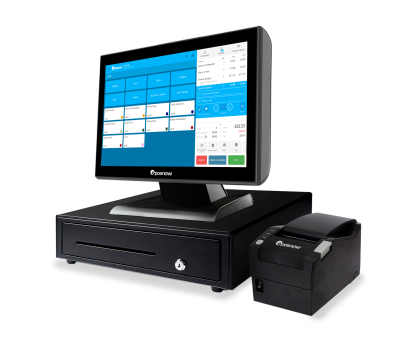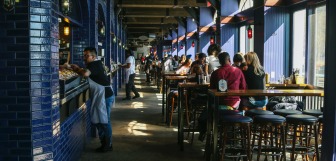How Much Does It Cost to Open a Restaurant? Cost Breakdown
Starting your own restaurant is the dream of thousands of chefs and entrepreneurs around the world. In the back of many young chefs' brains is a golden vision of what a restaurant should be and how they would bring it to fruition. As with all things, reality often sets in and those dreams are filed neatly away.
Some, however, have the right mix of grit and good luck that allows them to pursue their dreams. These budding restauranteurs have a long road ahead of them, but if they plan ahead, their new restaurant can become a reality.
There are many startup costs that come with opening a restaurant. Expenses for restaurants can very quickly add up and the underprepared restaurant owner will struggle to support themselves and their business. In this blog, we'll be exploring the costs in detail and providing helpful tips for new restaurant owners.
Restaurant Startup costs
Starting your own restaurant can be a deeply rewarding endeavor. There are few things finer than seeing a long-awaited dream restaurant slowly start to come together. While your initial instinct is to focus on restaurant food costs, there are many often overlooked costs to consider. The average restaurant startup costs include a lot of different restaurant prime costs. These include rent and building fees, restaurant labor costs, kitchen equipment, legal fees, the cost of obtaining a business license, and more.
It's difficult to answer the question of how much does it cost to open a restaurant as the startup costs vary from restaurant to restaurant. Depending on these variable costs, new restaurant owners can spend as little as $90,000 to as much as $2,000,000. The restaurant business is fickle and if you don't have a firm business plan in place, the cost of opening can quickly spiral to unmanageable levels.
Why do restaurant startup costs matter?
Simply put, if you can't afford your startup costs, then you won't be able to open a restaurant. The variable costs of a restaurant means that you'll need to have an airtight business plan and the means to stay on track with your initial budget. Otherwise, you'll fail before you even open.
Before you start your new business, sit down with a financial advisor and go through your business plan point-by-point. While you can't account for everything, you will be able to identify any weak spots in your plan and ensure that any hidden costs are exposed and minimized. Proper planning is your most powerful tool and you need to make sure everything is covered before you enter the restaurant industry.

Gain all the advantages of a POS system with detailed, flexible, downloadable reports, and so much more:
- Manage and update products quickly with easy-to-use software
- Expand your business into multiple channels and integrate with a variety of online platforms
- Manage multiple locations and salespoints with multi-site management
- Keep queues short with streamlined, modifiable sales processes
- Choose a setup that suits you with software and hardware options
Restaurant startup costs to consider
As we've mentioned above, the work and capital required to open a restaurant is staggeringly extensive. The associated costs come with a significant price tag and many restaurant startups fail at the planning stages. To help ensure you have the best start possible, we've compiled a list of costs you need to consider before you open a restaurant. Many small business owners have been caught up by an unexpected hidden cost so it's important to be as prepared as you possibly can be.
Securing a commercial space
When you begin to develop your restaurant concept, one of the most important aspects to consider is your physical restaurant space. The first question you should ask yourself is: should I build the restaurant up from the ground or should I move into an existing building? Both come with their own set of pros and cons. This really comes down to your initial budget.
For most new businesses, construction costs for a completely new building are prohibitively expensive. Even in cheaper markets, land is extremely expensive, and then you'd need to pay building fees. Unless you're independently wealthy or have the backing of wealthy partners, you should generally avoid starting from scratch and should move into an existing commercial space.
Starting your restaurant in a commercial space that has already been used for a hospitality business is your best bet for keeping costs low. At worst, you will have to pay initial development costs to prepare the restaurant for your diners. Be aware that unless you buy the property outright, you will have to pay rent. If you do plan to buy the property, ensure you have enough initial money for the down payment.
When you enter talks with a landlord be sure to understand your contract as you will usually be asked to cover utility costs. Also, check the average rent and building fees in your local area as you may be able to negotiate a lower price.
Decor and kitchen equipment
Now that you've found a commercial space, it's time to think about your interior design and your cooking equipment. While the decor may seem like a minor worry, guests will avoid your business like the plague if the vibe you give off is wrong. It simply won't do to have an upscale restaurant looking like a greasy diner.
When you're building your restaurant concept, think carefully about the vibe you wish to curate and the crowd you wish to attract. Use your ideas to inform how you decorate your restaurant. If you're opening a fast-casual burger joint, you won't need a candle on every table. Conversely, if you plan to serve the finest French cuisine, a plastic tablecloth won't be the way to go. If you have the budget, consult an interior designer with experience decorating restaurants and follow their lead.
While it might seem paradoxical, purchasing equipment can give you the chance to save money. It's an unfortunate fact of the restaurant business that many new restaurants fail. Once these restaurants fail, they will sell their used equipment more often than not. While new shiny equipment is nice if you can afford it, used equipment is usually just as good and significantly cheaper. If you're opening a franchise, the price of your equipment will be included in your restaurant franchise costs.
Utilities, rent, and building fees
On top of your upfront costs, there will be several costs that you'll need to pay from month to month. Your main monthly costs outside of food expenses will be the cost of restaurant insurance, property fees, and rent.
The rent and utilities are simple matters you can stay on top of by opening up a healthy dialogue with your landlord. While rent prices have increased nationwide, you should still be able to negotiate a good deal with the owner of your builder. Signing a longer contract may also help keep the rent price down.
Utilities are sometimes included in your rent so make sure you get clarification on this before you sign your contract. As a restaurant, you'll need gas, water, and electricity all hooked up before you open. Depending on where you're based, you'll either have a choice of national providers or one local provider. Be sure to shop around for the best deal.
Insurance is slightly more complicated but you can still handle it yourself. First, you'll need to get an understanding of what sort of insurance your business needs. Typically, a restaurant will require public and employer liability insurance and property insurance. You can then negotiate with an insurance company directly or hire an insurance broker to do it for you. A broker will generally charge a fee though they will provide advice and expertise.
Alcohol and food cost
It goes without saying that a restaurant without food is just an empty dining room. Menu pricing for ingredients and drinks is very different to supermarket pricing so you'll have to leave ample space in your budget for it. While a home chef may only buy the ingredients for a certain dish, restaurants need to be able to offer their menu every night.
Most restaurants buy their ingredients and drinks from wholesalers. The restaurant business has no shortage of wholesalers so you should be able to find one that can provide for your business needs. When choosing a wholesaler, be sure to get a sample of what they provide so that you can see the ingredients' quality for yourself. Restaurants will usually have a few different sellers providing different types of ingredients so make sure to encourage good working relationships with these people.
If you intend to serve alcohol, be aware that you'll need to secure restaurant licenses and permits. Rules vary from state to state so do your research and have a good understanding of what you'll need. You shouldn’t have any trouble securing a liquor license but you can always speak to your local government if you have any concerns.
Give your own restaurant a boost with powerful POS
Now we've answered the question of how much does it cost to open a restaurant, it's time to add the finishing touch. The Epos Now Complete Solution is a cutting-edge restaurant point of sale (POS) system that gives you efficient staff and inventory management tools, lightning-fast transactions, and access to an award-winning suite of apps.
The Epos Now restaurant POS system also generates automatic business reports. These reports give you a bird's eye view of your business and allow you to keep restaurant expenses to a minimum.
If you'd like to cut down on restaurant costs and learn more know more about Epos Now, get in touch with our expert team below.




